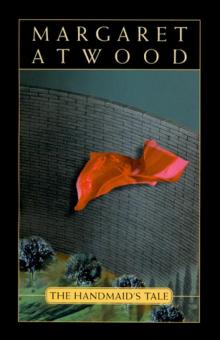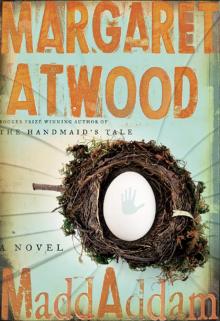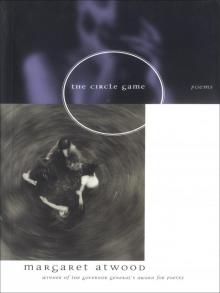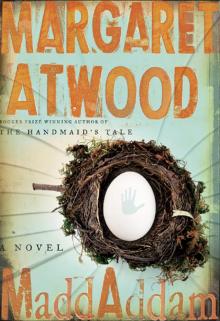- Home
- Margaret Atwood
The Robber Bride Page 4
The Robber Bride Read online
Page 4
Roz is packed into a suit that Tony recognizes from the window of one of the more expensive designer stores on Bloor. She shops munificently and with gusto, but often on the run. The jacket is electric blue, the skirt is tight. Her face is carefully air-brushed, and her hair has just been re-coloured. This time it's auburn. Her mouth is raspberry.
Her face doesn't go with the outfit. It isn't insouciant and lean, but plump, with cushiony pink milkmaid's cheeks and dimples when she smiles. Her eyes, intelligent, compassionate, and bleak, seem to belong to some other face, a thinner one; thinner, and more hardened.
Tony settles into her chair, parking her big tote bag under it where she can use it as a footstool. Short kings once had special foot cushions so their legs wouldn't dangle as they sat on their thrones. Tony sympathizes.
"So," says Roz after the preliminaries, "we're all in our places, with bright shiny faces. What's new? Tony, I saw the cutest outfit in Holt's, it would be so good for you. A mandarin collar - mandarin collars are back! - and brass buttons down the front." She lights her usual cigarette, and Charis gives her usual tiny cough. This part of the Toxique is not a smoke-free zone.
"I'd look like a bellhop," says Tony. "Anyway, it wouldn't fit."
"You ever consider spike heels?" says Roz. "You'd add four inches."
"Be serious," says Tony. "I want to be able to walk."
"You could get a leg implant," says Roz. "A leg enhancement. Well, why not? They're doing everything else."
"I think Tony's body is appropriate the way it is," says Charis.
"I'm not talking about her body, I'm talking about her wardrobe," says Roz.
"As usual," says Tony. They all laugh, a little boisterously. The wine bottle's now half empty. Tony's had only a few squirts of wine, mixed with Evian water. She's wary of alcohol in any form.
The three of them have lunch once a month. They've come to depend on it. They don't have much in common except the catastrophe that brought them together, if Zenia can be called a catastrophe; but over time they've developed a loyalty to one another, an esprit de corps. Tony has come to like these women; she's come to consider them close friends, or the next thing to it. They have gallantry, they have battle scars, they've been through fire; and each of them knows things about the others, by now, that nobody else does.
So they've continued to meet regularly, like war widows or aging vets, or the wives of those missing in action. As with such groups, there are more people present around the table than can be accounted for.
They don't talk about Zenia, though. Not any more, not since they buried her. As Charis says, talking about her might hold her on this earth. As Tony says, she's bad for the digestion. And as Roz says, why give her the air time?
She's here at the table all the same, thinks Tony. She's here, we're holding her, we're giving her the air time. We can't let her go.
The waitress comes for their order. Today she's a dandelion-haired girl in leopard-pattern tights and calf-high lace-up silver boots. Charis has the Rabbit Delite - for rabbits, not of them - with grated carrots, cottage cheese, and cold lentil salad. Roz has the Thick-cut Gourmet Toasted Cheese Sandwich, on Herb and Caraway Seed Bread, with Polish Pickle; and Tony has the Middle East Special, with felafel and shashlik and couscous and hummus.
"Speaking of the Middle East," says Roz, "what's happening there? That thing with Iraq. Your specialty, I guess, Tony."
The two of them look at Tony. "Actually, it's not," says Tony. The whole point about being a historian, she's tried to tell them, is that you can successfully avoid the present, most of the time. Though of course she's been following the situation; she's been following it for years. Some interesting new technology will be tested, that much is certain.
"Don't be coy," says Roz.
"You mean, is there going to be a war?" says Tony. "The short answer is yes."
"That's terrible," says Charis, dismayed.
"Don't shoot the messenger," says Tony. "I'm not doing it, I'm just telling you."
"But how can you know?" says Roz. "Something could change."
"It's not like the stock market," says Tony. "It's already been decided. It was decided as soon as Saddam crossed that border. Like the Rubicon."
"The what?" says Charis.
"Never mind, sweetie, it's just something historical," says Roz. "So is this really bad, or what?"
"Not in the short run," says Tony. "In the long run - well, a lot of empires have folded because they overextended themselves. That could go for either side. But right now the States isn't thinking about that. They love the idea. They'll get a chance to try out their new toys, drum up some business. Don't think of it as a war, think of it as a market expansion."
Charis forks up the grated carrot; she has a shred of it on her upper lip, an endearing orange whisker. "Well, anyway, it won't be us doing it," she says.
"Yes it will," says Tony. "Our attendance will be required. If you take the king's shilling, you kiss the king's ass. We'll be there, us and our falling-apart, rusty old navy. Now that's a disgrace." Tony is in fact indignant about this: if you're going to make men fight, you ought to give them decent equipment.
"Maybe he'll back down," says Roz.
"Who?" says Tony. "Uncle Sam?"
"Uncle Saddam, pardon the pun," says Roz.
"He can't," says Tony. "He's gone too far. His own folks would murder him. Not that they haven't tried."
"This is depressing," says Charis.
"You bet," says Tony. "The lust for power will prevail. Thousands will die needlessly. Corpses will rot. Women and children will perish. Plagues will rage. Famine will sweep the land. Relief funds will be set up. Officials will siphon off the cash from them. It's not all bad, though - the suicide rate will fall. It always does during wars. And maybe women soldiers will get a crack at front-line combat, strike a blow for feminism. Though I doubt it. They'll probably just be doing bandages-as-usual. Let's order another bottle of Evian."
"Tony, you are so cold-blooded," says Roz. "Who's going to win?"
"The battle, or the war?" says Tony. "For the battle, it'll definitely be technology. Whoever's got air superiority. Now who could that be?"
"The Iraqis have some kind of a giant gun," says Roz. "I read something about it."
"Only part of one," says Tony, who knows quite a lot about this because it interests her. Her, and Jane's Defence Weekly, and persons unknown. "The Supergun. It would have been a technological breakthrough all right; done away with medium-range aircraft and expensive rockets, cut down on the cost. Guess what they called it? Project Babylon! But the guy who was making it got himself murdered. A mad weapons genius - Gerry Bull. Best ballistics man in the world - one of ours, by the way. He'd been warned, sort of. Stuff kept moving around inside his apartment when he wasn't there. More than a hint, I'd say. But he kept right on building the gun, until bang - five bullets in his head."
"That's awful," said Charis. "I hate that."
"Take your choice," says Tony. "Think how many people the Supergun would have killed."
"Well anyway, I hear they're dug in," says Roz. "I hear they have deep cement bunkers. Bomb-proof."
"Only for the generals," says Tony. "Wait and see."
"Tony, you're such a cynic," says Charis, with a pitying sigh. She keeps hoping for Tony's spiritual improvement, which would consist, no doubt, of a discovery of previous lives, a partial lobotomy, and an increased interest in gardening.
Tony looks at her, sitting in front of her pretty dessert, the Assorted Sorbets, a ball of pink, a ball of red, a ball of curranty purple, spoon at the ready like a kid at a birthday party. Such innocence pains Tony, two ways at once. She wants to console Charis; also to shake her. "What do you want me to say? That we should all try for a more positive attitude?"
"It might help," says Charis solemnly. "You never know. If everyone did it."
Sometimes Tony would like to take Charis by the lily-white hand and lead her to the piles of skulls, to the hidd
en pits filled with bodies, to the starved children with their stick arms and ballooning stomachs, to the churches locked up and then burned with their sizzling prisoners howling inside, to the crosses, row on row on row. Century after century, back and back, as far as you can go. Now tell me, she'd say to Charis. What do you see?
Flowers, Charis would say.
Zenia would not have said that.
Tony feels a chill. The door must have opened. She looks up, and into the mirror.
Zenia is standing here, behind her, in the smoke, in the glass, in this room. Not someone who looks like Zenia: Zenia herself.
It's not a hallucination. The leopard-skinned waitress has seen her too. She's nodding, she's going over, she's indicating a table at the back. Tony feels her heart clench, clench like a fist, and plummet.
"Tony, what's wrong?" says Roz. She clutches Charis's arm.
"Turn your head slowly," says Tony. "Don't scream."
"Oh shit," says Roz. "It's her."
"Who?" says Charis.
"Zenia," says Tony.
"Zenia's dead," says Charis.
"God," says Roz, "it really is. Charis, don't stare, she'll see you."
"And after putting us through that idiotic service," says Tony.
"Well, she wasn't at it," says Roz. "There was only that tin can, remember?"
"And that lawyer," says Tony. After the first shock, she finds she is not surprised.
"Yeah," says Roz. "Lawyer, my fanny."
"He looked like a lawyer," says Charis.
"He looked too much like a lawyer," says Roz. "Face it, we were had. It was one of her numbers."
They're whispering, like conspirators. Why? thinks Tony. We have nothing to hide. We should march up to her and demand - what? How she could have the brass-plated nerve to still be alive?
They ought to go on talking, pretending they don't see her. Instead they're gazing at the tabletop, where the remains of their Assorted Sorbets have melted in pink and raspberry smears, floating on the white plates like the evidence of a shark attack. They feel caught out, they feel trapped, they feel guilty. It should be Zenia who feels like that.
But Zenia strides past their table as if they aren't there, as if nobody is. Tony senses them all fading in the glare that spreads out from her. The perfume she's wearing is unrecognizable: something dense and murky, sullen and ominous. The smell of scorched earth. She goes to the back of the room and sits down, and lights a cigarette and stares above their heads, out the window.
"Tony, what's she doing?" Roz whispers. Tony is the only one with a clear view of Zenia.
"Smoking," says Tony. "Waiting for someone."
"But what's she doing here?" says Roz.
"Slumming," says Tony. "The same as us."
"I don't believe this," says Charis plaintively. "I liked this day until now."
"No, no," says Roz. "I mean this city. Shit, I mean this entire country. She's burnt all her bridges. What's left for her?"
"I don't want to talk about her," says Tony.
"I don't even want to think about her," says Charis. "I don't want her messing up my head."
But there is no hope of thinking about anything else.
Zenia is as beautiful as ever. She's wearing black, a tight outfit with a scoop neck that shows the tops of her breasts. She looks, as always, like a photo, a high-fashion photo done with hot light so that all freckles and wrinkles are bleached out and only the basic features remain: in her case, the full red-purple mouth, disdainful and sad; the huge deep eyes, the finely arched eyebrows, the high cheekbones tinged with terracotta. And her hair, a dense cloud of it, blown around her head by the imperceptible wind that accompanies her everywhere, moulding her clothes against her body, fitfully moving the dark tendrils around her forehead, filling the air near her with the sound of rustling. In the midst of this unseen commotion she sits unmoving, as still as if she were carved. Waves of ill will flow out of her like cosmic radiation.
Or this is what Tony sees. It's an exaggeration, of course; it's overdone. But these are the emotions that Zenia mostly inspires: overdone emotions.
"Let's leave," says Charis.
"Don't let her frighten you," says Tony, as if to herself.
"It's not fear," says Charis. "She makes me sick. She makes me sick of myself."
Roz says, reflectively, "She does have that effect."
The two others gather their purses and begin the ritual of dividing up the bill. Tony is still looking at Zenia. It's true she's as beautiful as ever; but now Tony can detect a slight powdery dullness, like the bloom on a grape - a slight contracting of the pores, a shrinkage, as if some of the juice has been sucked out from under her skin. Tony finds this reassuring: Zenia is mortal after all, like the rest of them.
Zenia blows out smoke, lowers her gaze. She stares at Tony. She stares right through her. But she sees her all right. She sees all three of them. She knows how they feel. She's enjoying it.
Tony stops looking. Her heart inside her is cold and dense, packed together like a snowball. At the same time she's excited, tense, as if waiting for a short word, a command, clipped and deadly. Forward! Charge! Fire! Or something of the sort.
But also she's tired. Maybe she no longer has the energy for Zenia. She may not be up to her, this time. Not that she ever has been.
She focuses on the slick red tabletop, the black ashtray with its crumpled butts. The name of the restaurant is stamped on it in silver script: Toxique.
Euqixot. It looks Aztec.
What is she up to? thinks Tony. What does she want?
What is she doing here, on this side of the mirror?
6
The three of them troop out the door, one by one. Beating a retreat. Tony resists the impulse to walk out backwards: the casualty rates go up when you turn tail.
It's not as if Zenia has a gun. Still, Tony can sense the contemptuous ultramarine gaze drilling through the back of her flimsy little dotted-rayon dress like a laser. Pathetic, Zenia must be thinking. She must be laughing; or smiling, with the corners of her lush mouth upcurled. The three of them aren't major enough for a laugh. Shorn, Tony murmurs, to herself. As in armour, as in dignity, as in hair.
Tony felt safe this morning, safe enough. But she doesn't feel safe now. Everything has been called into question. Even in the best of times the daily world is tenuous to her, a thin iridescent skin held in place by surface tension. She puts a lot of effort into keeping it together, her willed illusion of comfort and stability, the words flowing from left to right, the routines of love; but underneath is darkness. Menace, chaos, cities aflame, towers crashing down, the anarchy of deep water. She takes a breath to steady herself and feels the oxygen and car fumes rushing into her brain. Her legs are wavery, the facade of the street ripples, tremulous as a reflection on a pond, the weak sunlight blows away like smoke.
Nevertheless, when Roz offers to drive her home, or wherever she's going, Tony says she'll walk. She needs the interlude, she needs the space, she needs to ready herself for West.
This time the three of them don't kiss the air. Instead they hug. Charis is shivering, despite her attempt at serenity. Roz is flippant and dismissive, but she's holding back tears. She'll sit in her car and cry, blotting her eyes on her bright jacket sleeve, until she's ready to drive back to her penthouse office. Charis on the other hand will amble down to the Island ferry dock, peering into store windows and jay-walking. On the ferry she'll watch the gulls and visualize being one, and try to put Zenia out of her mind. Tony feels protective towards the two of them. What do they know about the hard dark choices? Neither one of them is going to be a whole lot of help in the coming struggle. But then, they have nothing to lose. Nothing, or nobody. Tony does.
She makes her way along Queen, then turns north on Spadina. She wills her feet to move, she wills the sun to shine. He either fears his fate too much, Or his deserts are small, Who puts it not unto the touch, To win, or lose it all, she repeats in her head. A bracing verse, a gene
ral favourite, a favourite of generals. What she needs is some perspective. Some evitcepsrep. A medicinal word.
Gradually her heart settles. It's soothing to be among strangers, who require from her no efforts, no explanations, no reassurances. She likes the mix on the street here, the mixed skins. Chinatown has taken over mostly, though there are still some Jewish delicatessens, and, further up and off to the side, the Portuguese and West Indian shops of the Kensington Market. Rome in the second century, Constantinople in the tenth, Vienna in the nineteenth. A crossroads. Those from other countries look as if they're trying hard to forget something, those from here as if they're trying hard to remember. Or maybe it's the other way around. In any case there's an inturned, preoccupied cast to the eyes, a sideways glancing. Music from elsewhere.
The sidewalk is crowded with lunchtime shoppers; they avoid bumping into one another without seeming to look, as if they're covered with cat whiskers. Tony weaves in and out, past the vegetable stores with their star fruit and lichees and long crinkly cabbages set out on stands at the front, the butchers with their glazed reddish ducks dangling in the windows, the linen shops with their cutwork tablecloths, their silk kimonos with good-luck dragons embroidered on the backs. Among Chinese people she feels the right height, although she is not unaware of how she might be viewed by some of them. A hairy white foreign devil; though she is not very hairy, as such things go, or very devilish either. Foreign, yes. Foreign here.
It's nearly time for her to get her hair cut, at Liliane's, two blocks up and around the corner. They make a fuss of her there: they admire, or pretend to admire, her small feet, her tiny mole-paw hands, her flat bum, her heart-shaped mouth, so out of date among the pouty bee-stung lips of the fashion magazines. They tell her she is almost Chinese.
Only almost, though. Almost is what she has always felt; approximate. Zenia has never been almost, even at her most fraudulent. Her fakery was deeply assumed, and even her most superficial disguises were total.
Tony walks and walks, up Spadina, past the old Victory Burlesque - which victory, whose victory, she wonders - now stuck with posters advertising films in Chinese, past Grossman's Tavern and across College Street, where the Scott Mission offers Christian soup, to more and more people with less and less money. She can walk all the way home, she has no classes today. She needs to regroup her forces, she needs to ponder, she needs to plan her strategy. Though how much strategy can you plan with so little to go on? For instance, why has Zenia chosen to resurrect herself? Why did she go to the trouble of blowing herself up in the first place? For her own reasons, perhaps; nothing to do with the three of them. Or with the two of them, with her and West. Still, it's bad luck that Zenia spotted her in the Toxique.

 Surfacing
Surfacing Hag-Seed
Hag-Seed Oryx and Crake
Oryx and Crake The Heart Goes Last
The Heart Goes Last The Handmaid's Tale
The Handmaid's Tale Lady Oracle
Lady Oracle Good Bones and Simple Murders
Good Bones and Simple Murders The Robber Bride
The Robber Bride Life Before Man
Life Before Man Alias Grace
Alias Grace The Blind Assassin
The Blind Assassin Cat's Eye
Cat's Eye The Testaments
The Testaments The Penelopiad
The Penelopiad MaddAddam
MaddAddam Dancing Girls & Other Stories
Dancing Girls & Other Stories On Writers and Writing
On Writers and Writing Selected Poems II (1976-1986)
Selected Poems II (1976-1986) Wilderness Tips
Wilderness Tips Dearly
Dearly The Tent
The Tent Bluebeard's Egg
Bluebeard's Egg The Edible Woman
The Edible Woman The Penelopiad: The Myth of Penelope and Odysseus
The Penelopiad: The Myth of Penelope and Odysseus Good Bones
Good Bones I Dream of Zenia with the Bright Red Teeth
I Dream of Zenia with the Bright Red Teeth Circle Game
Circle Game Choke Collar: Positron, Episode Two
Choke Collar: Positron, Episode Two Stone Mattress: Nine Tales
Stone Mattress: Nine Tales The MaddAddam Trilogy
The MaddAddam Trilogy Stone Mattress
Stone Mattress Power Politics
Power Politics MaddAddam 03 - MaddAddam
MaddAddam 03 - MaddAddam I’m Starved for You (Kindle Single)
I’m Starved for You (Kindle Single) Murder in the Dark
Murder in the Dark In Other Worlds
In Other Worlds Dancing Girls
Dancing Girls Moral Disorder
Moral Disorder